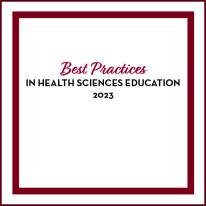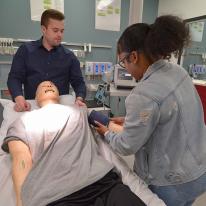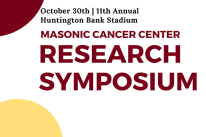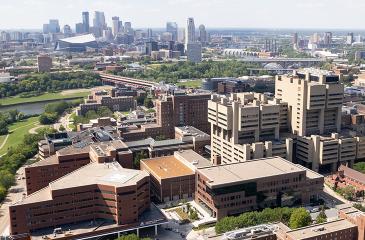Across the health sciences, we are treating patients and making discoveries that improve health care in Minnesota and around the world. When we talk about academic health, we mean providing the highest level of care possible by driving innovation, improving access to care, and reducing burdens on patients and families.
The University trains Minnesota’s health care workforce (70% of physicians, 60% of pharmacists, 73% of dentists, 69% of public health professionals, and 70% of the veterinary DVM workforce), offers Minnesota’s only PhD program in nursing, and serves more than 1.3 million patients per year.
We are one of the largest, most comprehensive academic health centers in the nation. With all six health sciences schools and their affiliated programs working together in this University, we have unique opportunities to explore interprofessional health care models. Additionally, we partner with more than 2,000 clinical training sites across the state to provide interdisciplinary training for Minnesota’s health care workforce, many in underserved and rural communities.
The benefits of academic health are clear: from better patient outcomes, access to cutting-edge diagnostics, advanced treatments, specialized care and clinical trials, to healthier local communities statewide and health care advancements for future generations.
As students return for the fall semester, let us remember what makes the health sciences here at the University stand out and stand together—our collective knowledge and expertise, our commitment to collaboration and excellence, and our impact on the state of Minnesota.
Driving Innovation & Discovery

Turning Science into Health: Overcoming Barriers in Translation
The goal of this new CTSI funding program is to streamline the process of translating scientific discoveries from ideas to real-world impact for improved human health. This funding program aims to support projects that seek to understand scientific or operational barriers that researchers encounter during the process of translating discoveries, or find innovation solutions that reduce, avoid, or mitigate barriers in the process of translation.

Best Practices in Health Sciences Education
This annual conference brings together educators, administrators, learners, and thought leaders to foster connectivity and share cutting-edge best practices and research-based methodologies in health sciences education. This year’s event, Precision Health Science Education:
Expanding Opportunities for Adaptive, Individualized Approaches to Learning, includes the keynote presentation, “Precision Education for the Health Sciences: An Organizing Framework.” The conference is a dynamic collaboration between U of M health sciences schools and colleges, as well as higher education institutions in Greater Minnesota and beyond. Register now for early bird rates.
Advancing Interprofessional Education & Training

The Pre-Health M Simulation Bridge Initiative: Addressing the Health Care Workforce Shortage
The Pre-Health M Simulation Bridge Initiative engages community college students, guiding them through simulation experiences and informative sessions to explore health care fields and transfer to health career programs. The pilot events exposed participants to clinical skills, IV training, and patient communication. This initiative aims to inspire students and alleviate the growing health care workforce deficit by fostering partnerships between community colleges and universities.

Apply for the Itasca Ecohealth IPE Experience
The Itasca Ecohealth IPE Experience: Exploring Sustainability through Collaboration is an intensive, fun weekend-long collaborative learning retreat for health sciences students, situated in a Minnesota state park to foster appreciation for ecohealth principles and geopolitical considerations in health. Applications are open through Sept. 13.

WILD Series Continuing Education Offerings
Join the Center for Interprofessional Health and your colleagues in practice in the upcoming WILD Series (Workplace Interprofessional Learning & Development) continuing education offering focused on teams and teamwork. Participants build interprofessional skills as a preceptor and health professional through five actionable weekly emails and a one-hour group debriefing session, which is a chance to learn with, from, and about colleagues from a myriad of health professions.
U Wide Events and Opportunities

Ethical Challenges: AMA Discharges & Involuntary Hospitalization Webinar
Join the Center for Bioethics for an insightful webinar on Aug. 29 and delve into the ethical challenges surrounding AMA discharges and involuntary hospitalization.

Masonic Cancer Center Research Symposium
Submit your abstract for the 11th Annual Masonic Cancer Center Research Symposium by Sept. 11.
Aug. 30: Bakken Center Mindfulness Programs
Get an introduction to mindfulness meditation.



